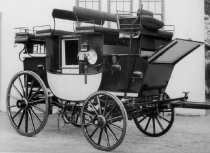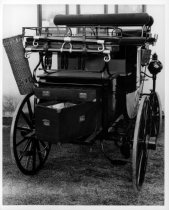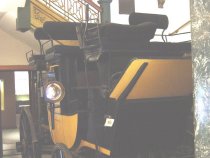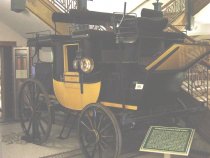Object Record
Images




Metadata
Title |
Park Drag, 1904 |
Object Name |
Coach, Road |
Description |
Park Drag, 1904. Black and yellow in color. Seventeen persons can be accomodated--four inside. For picnics, provisions and wine are carried in special compartments at the rear of the coach. A small wooden rack on the ceiling of the coach holds the horsewhip when the coach is not in use. A collapsible ladder for roof access and an umbrella basket hang on the rear of the coach. The coachman sits on the double cushion in the driving box. According to Brewster & Company Specification Records, this Park Drag was made for C.W. Watson and was completed November 25, 1904. Accessories included: a brake shoe and chain, wine coolers, tray, an folding iron ladder, watch case (key) 2 keys, push hand brake with rubber block , tufted driving cushion, a whip socket mounted on the rail, driving box, umbrella basket, 2 rubber mats and straps, hat rack, 5 coat hooks 2 hinged and removable lazy backs, straps for jointed whip, mirror in near (left) side stable shutters, polished lead bar fixtures and seat covers for the rear seat for inclimate weather. It has round lamps that could be secured in the interior when not in use by leather straps. Its final weight upon completion was 2,567 pounds. According to the Brewster specification records, it originally had white body panels with "Essex" green toe board, under carriage and seat risers, and no striping. The trimming (upholstery) was Oxford mixed cloth and linoleum outside with an interior of black tufted leather and linoleum. It was sold to C. W. Watson November 16, 1904 according to the Brewster & company sales book 4, page 105. It was painted yellow and black when restored and bears the monogram of Lurline Berenice Matson on the crest panel. Mfg: Brewster & Company, New York, NY. Part of the San Mateo County Historical Association's carriage collection. |
Date |
November 25, 1904 |
Creator |
Brewster & Company, NY |
Role |
Manufacturer |
Catalog Number |
1973.421 |
Dimensions |
H-97 W-77 D-146 feet |
Collection |
3D - Land Transportation Tools & Equipment |
Inscription Text |
"LRB" (painted on crest panel) |
Provenance |
-According to Brewster & Company Specification Records, this Park Drag was made for C.W. Watson and was completed November 25, 1904. -From the Roth Collection at Filoli. -The Roth Collection is particularly significant as all of the carriages were built by one of the two Brewster firms in New York City, producers of the finest quality vehicles for America's leading families. The National Carriage Association in Staten Island has the original records of the Brewster Company. Since Roth carriages were produced for use in California, they evidence some special changes to adapt them to their owner's way of living. As of June 10, 1973, each carriage was in superb condition, never having been restored. Each carriage bears an individual registration number from the factory. The carriages were built almost entirely of wood, and many coats of paint were applied, each coat rubbed and polished until it was mirror-smooth. As the paint of that era dried slowly, there often was more than a week's wait between the application of coats. |
Notes |
A Park Drag is a type of coach used for the sport of driving four horses. Its similarities to a Road Coach include a fixed roof, enclosed body, seats inside the body and on the top. Both types were based on the English Mail Coach of the late 18th century, made famous for its punctuality that reflected the skill of the driver, or "whip." Most notable among these commercial drivers was John Palmer, whose improved times and horsemanship inspired the formation of private gentlemen’s driving clubs to promote the sport of coaching. The sport was introduced in America by William Jay and Delancey Astor Kane who formed the New York Coaching Club in 1875. The members’ excursions, as a club or as individuals to scenic excursions or regular routes were notable social activities. Coaching classes were included in competitions such as the National Horse Show in Madison Square Garden. Rules for "turn out" of coaches that distinguished Park Drags from Road Coaches were published and served as guidelines for correctness. However, Brewster & Company’s design drawings illustrate the foundation designs for these coaches that could be customized to meet the needs of their clients. A Park Drag was considered a more formal vehicle and was generally lighter in weight. Its characteristics included a skeleton bracket for the rear (groom’s) seat and a rear boot that opened with the door dropping forward. The boot held felt lined wooden drawers that held glasses and zinc lined boxes that held wine. It was common for coaching trips to include libations, especially when the owners and passengers attended equestrian events such as polo or racing. Recessed brass handles and brass plates allowed the cases and drawers to be pulled forward. It was not uncommon for a Park Drag to include an Imperial, a box that served as food storage and table that fit between the roof seats. [Carriage Consultant Merri Ferrel 8/2021] This vehicle is the most outstanding one in the Roth collection. If shown at the Royal Winter Fair, it would be second to none because of its superb condition. It was delivered from the Brewster factory in New York to a C.W. Watson on November 16, 1904. The purchase price was $2,800. At that time, Brewster carriages were the finest in America and were a requirement of every well-to-do household. The Watson-Roth Park Drag was originally white and Essex Green. Its equipment included an iron ladder, a watch and case, a tufted driving cushion, a hat rack and 5 coat hooks, a mirror and a stable shutter. Perhaps the most outstanding features are the rear wine coolers with fitted tray for glasses, the umbrella basket and the interior seats covered in tufted black leather. The ivory builder's plates on the door interiors should also be noted. The magnificent coach lanterns are a later addition. The total weight is about 2,400 pounds. As roads improved, the private Park Drag was developed from stage or road coaches. With increasing refinement came very precise rules and procedures for the Park Drag's appearance and usage. By the late 1800s, driving for pleasure had become an exacting performance. The key was simplicity. The total design or "turn out" could attract attention, but in a subtle manner. Only the occasional brilliance of uncommonly good horseflesh was permitted. The servants should be clad in smart, well-fitting and well put on liveries and carry themselves with an air of pride. The private coachman could wear neither a mustache nor a beard, for this was an indication of ignorance of his calling. The harness and livery were equally proscribed. The full complement of perfect carriage, 4 matched horses with polished harness and monograms, and exactly costumed grooms presented a spectacular piece of material culture and way of life attained by a very few. A distinction was made between the stage/road coach and the drag; though very similar in design, the road coach was intended for public stagecoach use, while the drag was for private sporting use. This resulted in the drag being slightly lighter in weight and able to be slightly more ornamented than the road coach, though simplicity in design was still emphasized. "Brewster & Co. was founded by Henry Brewster, a son of James Brewster, a noted early-19th-century carriage builder at New Haven. Henry Brewster's firm was founded in 1856 and was first known as Brewster of Broome Street, New York, but changed the name to Brewster & Co. when its main office was moved to Broadway and 47th Street in 1874. Under the direction of John W. Britton, one of the partners in the firm, Brewster & Co. became the leading builder of high-class carriages in the U.S., and enjoyed the custom of most of the prominent personalities in New York society and elsewhere." [https://carriageassociationofamerica.com/carriage-tour/stanhope-gig/ 08/02/2018] |
Search Terms |
Bourn, William Brewster Carriage Carriages Filoli Horse Drawn Vehicles Roth, Lurline Matson |
Subjects |
Carriages & coaches Picnics Leisure |
People |
Roth, Lurline Matson Watson, Clarence Wayland |
Credit line |
Courtesy of Mrs. William P. Roth |
